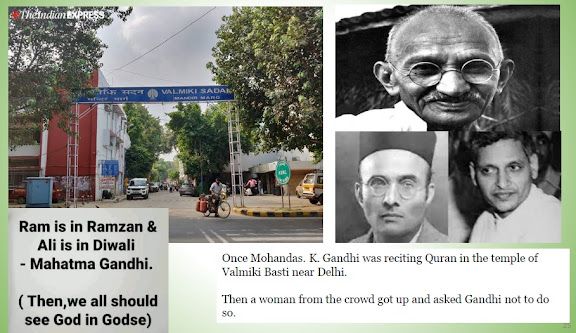ENACT ONE COMMON NATIONAL CENTRAL ACT TO STOP RELIGIOUS CONVERSION IN INDIA
Anti-Conversion Laws restricting religious conversions were
introduced in Colonial Times itself by princely states headed by Hindu royal
families during the British colonial period — particularly during the latter
half of the 1930s and 1940s.
These states enacted the laws “in an attempt to preserve
Hindu religious identity in the face of British missionaries”. There were “over
a dozen princely states, including Kota, Bikaner, Jodhpur, Raigarh, Patna,
Surguja, Udaipur, and Kalahandi” that had such laws.
After Independence, many attempts to enact “A National Law of
Anti-Conversion” met with failures due to inadequate supports in both the
houses of Parliament.
First attempt was in 1954 by the introduction of the Indian
Conversion (Regulation and Registration) Bill which sought to enforce
“licensing of missionaries and the registration of conversion with government
officials”. This bill failed to gather majority support in the Lok Sabha.
This was followed by the introduction of the Backward
Communities (Religious Protection) Bill in 1960, “which aimed at checking
conversion of Hindus to ‘non-Indian religions’ which, as per the definition in
the Bill, included Islam, Christianity, Judaism and Zoroastrianism”.
Again in 1979, the Freedom of Religion Bill was introduced in
Parliament which sought “official curbs on inter-religious conversion.” These
bills were also not passed by Parliament due to a lack of political support.
In 2015, the Union law ministry had given the opinion that a
law against forced and fraudulent conversions could not be created at a
national level, since law-and-order is a State subject under the Constitution.
However, state governments can enact such laws.
Hence as of now, there is no central anti-conversion law, but
only laws enacted by State Governments.
Out of total of 29 States in India, Anti-Conversion Laws or
Freedom of Religion Laws are currently in force in nine states — (i) Odisha (1967), (ii) Madhya Pradesh
(1968), (iii) Arunachal Pradesh (1978), (iv) Chhattisgarh (2000 and 2006), (v)
Gujarat (2003), (vi) Himachal Pradesh (2006 and 2019), (vii) Jharkhand (2017),
(viii) Uttarakhand (2018), (ix) Utter Pradesh 2020. (Karnataka will be the
tenth State to enact Anti-Conversion Laws – Laws Approved in the Legislative
Assembly – but yet to be introduced in Legislative Council.)
There are certain common characteristics of the various state
laws. While all states have banned conversions by force, fraud or allurement
and inducement of money, only the Himachal Pradesh, Uttarakhand and UP laws
place a ban on conversion through marriage.
Punishment: Odisha and Madhya Pradesh, which have the oldest
laws, also prescribe the lowest imprisonment time — one year for forced
conversion. Himachal Pradesh and Uttarakhand prescribe up to five-year jail
term for forced conversion.
In case of a minor or a woman, the punishment is higher in
all states.
In 2002, Tamilnadu Government under Jayalalitha had brought
“The Tamil Nadu Prohibition of Forcible Conversion of Religion Bill 2002”, but
repealed the same in June 2004, after the defeat of the BJP-led coalition 2004
election.
From the above Statistics, it is clear that India needs
Anti-Conversion Law at National Level to safeguard the HINDUISM from the
efforts of non-Indian Religions such Christianity, Judaism and Zoroastrianism
activities of forceful and alluring conversions of gullible masses including
poor and illiterate tribals and Scheduled Castes and Scheduled Tribes.
According to 2011 census data, 79.80% of the population of
India is Hindu, 14.23% Muslim, 2.30% Christian, 1.72% Sikh, 0.70% Buddhist, and
0.37% Jain.
In view of the failed attempts to enact Anti-Conversion Laws
at National Level, States level statues viz. India’s Freedom of Religion Acts
or “anti-conversion laws” are enacted to regulate religious conversions that
are not purely voluntary. Orissa and Madhya Pradesh states were first to enact
Anti-Conversion Laws.
Conversion is a sin and a disease.
The Christian Missionaries who are in the forefront forces in
their efforts to implement forceful conversions especially Hindu Majorities,
quote and want safeguard under the Constitutional fundamental rights to
practice and promote their religion.
Freedom of religion in India is a fundamental right
guaranteed by Article 25-28 of the Constitution of India wherein it was laid
down that every citizen of India has a right to practice and promote their
religion peacefully.
But the Hindu Religious Majority have strong objection that
by the unethical and undemocratic acts of these Christian missionaries due to
their unfair methods to convert Hindus, the Peace of the Land will be at peril
and hence such activities should be stopped legally. Conversion is a sin and a
disease to be dealt with politically, economically and religiously apart from
enacting suitable laws at National Level.
There are many instances of riots due to such forceful
conversions with loss of lives and properties.
Love of Religion cannot be equated with Lure of Religion.
Missionaries of non-Indian Religions especially Christianity
should have purity of actions, when they extend their helping hands to the
needy Hindus without any ulterior motives.
Preaching about the greatness of the Christianity is allowable, but,
Unholy Acts of criticizing Hindu Gods and Goddesses and of Cultural Customs
practiced by Hindus will not be protected under the Fundamental Rights
guaranteed by our Holy Constitution.
Hinduism is the world's oldest religion, according to many
scholars, with roots and customs dating back more than 4,000 years, whereas the
Christianity is of 2000 years old only.
Hence Hinduism which is rich in Vedic literatures, strong in
epics, eternal in Spirituality and Yogic Practices, had survived many
onslaughts from alien religions of
recent origins – though Hinduism is mostly confined to Bharat – that is India.
Jesus said, “Father, forgive them, for they do not know what
they are doing.”
Let me modify Jesus’s Statement thus: “Father, Punish them,
for what they are doing.”
JAI HINDUISM ! JAI
BHARAT !





Comments